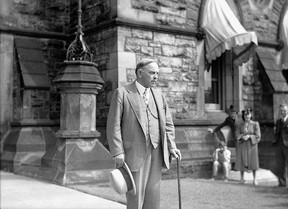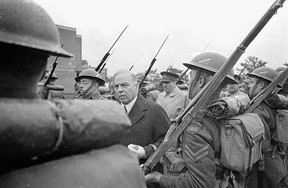Article content
Hitler, incidentally, would have the exact opposite reaction. When the dictator visited Nazi-occupied Paris a mere three years later, he made a point of visiting Napoleon’s remains in order to suss out ideas for his own grandiose mausoleum.
Article content
Ultimately, King and Hitler only met for slightly more than an hour. For the Nazi leader, the meeting with the Canadian Prime Minister had been just one appointment among many; a diplomatic nicety shoehorned into a day jammed with briefings and strategy sessions.
Article content
But to King, it was a triumph.
Article content
The next morning, the prime minister had a “vision” of standing in a beautiful summer field tinged with red roses. At the field’s edge rose the buildings of Parliament Hill, all of which seemed fresher and newer than before.
Article content
“The improvement in the buildings was clear — it was a work of reconstruction for which I was responsible,” he wrote.
Article content

Article content
King had travelled to Berlin just as Canada had begun beefing up its defence budget for fear that they would once again have to fight an increasingly militaristic Germany.
Article content
Article content
“We have no desire for war; our people don’t want war and we don’t want war,” Hitler told King upon hearing this.
Article content
It would be a common Nazi refrain right up until the moment that German troops would begin sweeping through Europe. Everyone from Soviet leader Joseph Stalin to U.K. Prime Minister Neville Chamberlain would at some point accept the word of Hitler that the German dictator had no dreams of conquest.
Article content
But King didn’t just believe Hitler; he called the statement a “real note of humility.”
Article content
The German leader then looked the Canadian in the eyes and gave a chilling prediction of what another world war would do to Europe.
Article content
“Let us assume a war came. What would it mean?” he said.
Article content
Regardless of who won, both sides would lose a generation of men — only to then conquer an enemy whose territory had been completely reduced to ashes.
Article content
“We would have obliterated civilization of both countries, indeed of greater part of Europe; all that would be left, would be anarchy,” said Hitler.
Article content
Article content
As King travelled home to Ottawa via France, he was roughly following the same route that nearly 300,000 Canadian soldiers would soon have to take going the other direction. Of those, more than 40,000 would never return.
Article content
When war began to break out in Europe only two years after King’s visit, the prime minister had no illusions about what it would mean.
Article content
He envisioned France and the U.K. being turned to rubble, and had a particularly strong mental image of St. Paul’s Cathedral collapsing to the ground. (The London landmark survived World War II).
Article content
Meanwhile, he had “no doubt” that Canada wouldn’t escape this world war unscathed. He predicted that Canada’s coasts, harbours and even some of its inland cities would be bombed.
Article content

Article content
And yet, it would take time for King to understand the Second World War as being the tailor-made creation of the “calm, passive” man he had met in Berlin that summer’s day in 1937.
Article content
Even as King ramped up his country for another European war, he wondered whether Poland was to blame for provoking this new war, or whether France and the U.K. had simply been too inflexible with the Third Reich.
Article content
“One hardly knows whether to think he was sincere at the time of speaking or not,” wrote King of Hitler on September 6, 1939, the eve of Canada’s declaration of war against Germany.
Article content
“He evidently has turned in a completely opposite direction.”
Article content
Article content
Our website is the place for the latest breaking news, exclusive scoops, longreads and provocative commentary. Please bookmark nationalpost.com and sign up for our daily newsletter, Posted, here.
Article content
.png)




